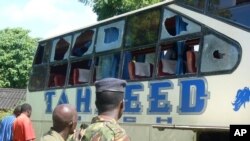Nearly 100 people have died since mid-June in a series of ambushes and raids in northern Kenya's coastal Lamu County.
Despite the heavy presence of Kenyan security forces, civilians are increasingly targeted in the attacks, forcing many locals to flee or spend their nights in government facilities.
On June 15, gunmen attacked the coastal town of Mpeketoni, southwest of Lamu, killing at least 60 people in the predominantly ethnic Kikuyu community.
Less than six weeks later, gunmen attacked civilians and security forces in the surrounding coastal areas, most recently leaving at least two police officers and seven civilians dead in a July 18 attack on a bus in Witu, near the Kenyan holiday island of Lamu.
On July 20, at least four people were killed and several others injured in a raid by armed gunmen in the Kenyan port city of Mombasa, an attack that will further dent Kenya's beleaguered tourist industry and deepen public frustrations about poor security.
While Somalia's al-Shabab militants have claimed responsibility for many of the assaults, high level government officials, including President Uhuru Kenyatta, have suggested local politicians feuding over land-ownership issues are behind some of the attacks.
It's a claim that some locals support.
"Since a man from central [Kenya] was elected to be a member of parliament [representing Lamu] — that was last year — that’s why most of the coast people got annoyed that someone from central can become a member of parliament in Lamu," said Mpeketoni resident Diana, who gave only her first name for fear of retribution. "In Lamu, it's well known that it belongs to the coast people."
Regardless of who's ultimately responsible, however, Colonel Benjamin Mwema, spokesperson for the Political Parties Collaborative Leaders Forum, an umbrella organization for Kenyan politics, says the ongoing violence is turning Kenya's coastal region into a breeding ground for terrorists.
Al-Shabab militants, he says, deliberately exploit longstanding social and economic tensions in the region to recruit local youths who help the group carry out attacks.
“These people know the terrain and the ground very well," he said. "You blend them with al-Shabab from outside the country and make sure you make coordinated and well-planned local attacks, which will then be blamed on either the locals or politics.
"This helps al-Shabab create a situation which is fluid, whereby the government is putting a lot of resources within Lamu and therefore leaving other areas open they can also exploit,” he said.
According to historians, regional politics has fueled episodic violence since Kenya gained independence in the 1960s, when Kikuyu communities were settled in some coastal areas, especially Lamu county, where they were provided with title deeds, a document the indigenous people did not possess.
Most political figures from coastal regions have since campaigned on a local land rights platform, and last year's general election was no different. Lamu Governor Issa Timamy was arrested and taken to court last month in connection with the recent violence, although he has yet to be charged.
On Thursday a Nairobi court charged four terror suspects, one Ugandan and three Kenyans, who were arrested with bomb-making materials over the weekend in Mombasa's impoverished Majengo neighborhood.
For coastal residents like Diana, however, the culture of fear and violence is breeding xenophobia.
"It has been very good, but now when these things happened, people ended up hating one another," she said. "When one sees a [coastal] or Swahili person, one ends up saying that 'this people they are one of those people who killed our people,' so the hate rate is kind of starting something that was not there."
Kenyan authorities have sent thousands of security forces to pursue the attackers, who are believed to be hiding in the Boni National Reserve, a densely-canopied forest situated in north of Lamu county along the Somalian border.
Al-Shabab insurgents have repeatedly vowed to carry out attacks in Kenya to avenge the presence of Kenyan troops fighting the Somali-based militants alongside African Union peacekeeping forces.











